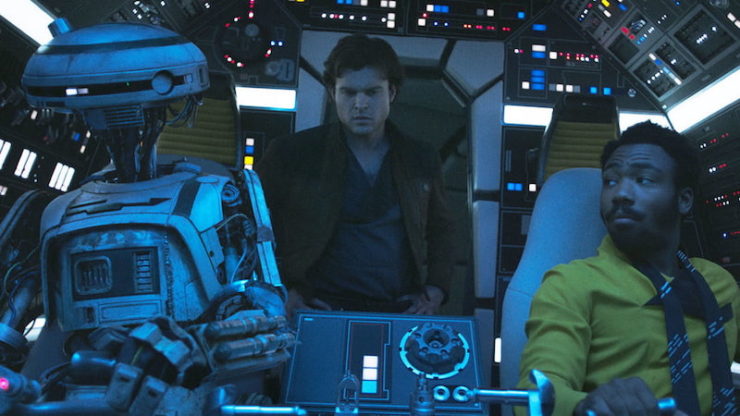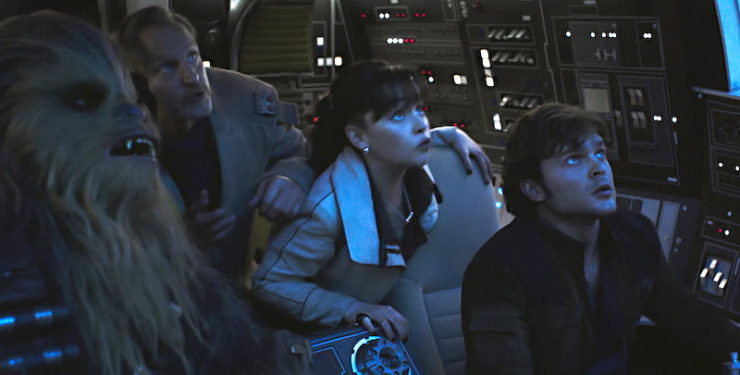If Han Solo is by-and-large the world’s favorite Star Wars character (they’ve done polls: he is), then any film focusing on him should be a sure thing. And despite a handful of mega hiccups during production, and some concerned side-eye from lifelong fans before the final trailer dropped, that’s precisely what Solo: A Star Wars Story is—an adventure-packed, yet riskless, sure thing.
[Major spoilers for Solo]
Set roughly ten years before A New Hope, Solo fills us in on Han’s youth, covering his escape from slavery on Corellia to his very first smuggling gig that started him on the path toward scoundrel-hood. Alden Ehrenreich had some enormous shoes to fill, and while he’s not Harrison Ford (because no one else can be), he manages a charming performance that feels like the same character while still making the part his own. Much of the character’s backstory from the Legends canon was preserved for the sake of the film: his childhood on Corellia, stealing on behalf of another to survive, his enrollment in the Imperial Academy, his meet-cute with Chewbacca while he’s trying to leave the Empire. Han’s choice to become an Imperial officer turns out to be born of necessity; he tries to escape with his girlfriend Qi’ra when they’re teens, but she gets caught and urges him to go without her. He jumps at the sight of the enlistment booth because it’s his only sure way of escaping the authorities who are out to get him.
Han falls in with his first criminal crowd in effort to escape certain death working for the glory of the Emperor, meeting Tobias Beckett (Woody Harrelson), his wife Val (Thandie Newton), and Rio Durant (voiced by Jon Favreau) as they are stealing a ship from the Imperials. After getting a hitch for himself and Chewie, Han volunteers to be part of their mission, hoping the money he gets from the score will let him buy a ship so that he can come back to find Qi’ra. It all goes sideways and half the crew wind up dead (Rio Durant is an irritating enough character that he’s not really missed, sorry), but the job turns out to be for the criminal syndicate Crimson Dawn, landing Han and Chewie in a whole lot of hot water if they don’t make up what they lost.
Solo is supposed to be a story about a “lawless time,” a point when the Empire’s control of the galaxy led to huge pockets of unchecked criminal activity—we’re introduced to the Crimson Dawn syndicate, an outfit that turns out to be run by Darth Maul, fresh off his part in Star Wars: The Clone Wars, where he gained experience in building another criminal enterprise known as the Shadow Collective. It’s fun to see what Maul’s up to between the events of Clone Wars and Star Wars: Rebels, but the larger game is still a mystery here; it is unclear why Maul has elected to run a syndicate like Crimson Dawn, whether he’s trying to gain power for the sake of it, or hoping to amass enough muscle to challenge the Emperor. There is a lack of context in Solo that might hurt it in places—if you’re curious about the universe you’ve landed in, but you’re not a Star Wars devotee, a lot of information is glossed over. In a movie jam-packed with Easter eggs, the people who are best-served are the ones who’ve been on this ride for ages.
The shining star of the film was always going to be Donald Glover’s reintroduction of Lando Calrissian, and while he’s used sparingly, it’s hard to wish the movie hadn’t simply been called Lando from the start. (He talks about loving his mother at one point, and if we do not meet Lando Calrissian’s mom at some later date, so help me…) Glover’s take on a younger Lando sees the smuggler in his rougher years, where he clearly survived every encounter by being suave, beautiful, and distractingly ostentatious—a combo that works like a dream and does an excellent job at showcasing the odd couple dynamic that Han and Lando have whenever they share the same screen. Lando is far more canny than Han, and has a much clearer conception of self than baby Solo does at this point in time. But it’s Han’s optimism, his clear insistence that they must be friends after everything they’ve gone through together, that perpetuates any kind of dynamic between the two of them. The idea that Lando has been resistant to Han Solo infiltrating his life throughout the entirety of their friendship is something that could easily power several Solo films, and several more Lando films while they’re at it.

Another highlight is the continued building and easy rapport of Han and Chewie’s relationship (plus Han’s ability to speak Shyriiwook, even if he sounds ridiculous doing it). A powerful bond built on one character being endlessly verbose and the other constantly grunting and shaking his head, is the stuff that silent film comedy dreams were made of, but there’s something special about Han and Chewie, and the film wouldn’t have landed if the two hadn’t connected. They happily do, and knowing that Chewie is looking for his family in the midst of the Empire’s mass enslavement of his kind is another tangent that the movie deliberately doesn’t resolve, as it’s perfect fodder for more films.
Solo takes its cues from old westerns, and while that makes for a few fun tropes—rain heists, showdowns at high noon, betrayals and gruff heroics—one of the less enjoyable places where the film mimics the genre is in the often devastating ways it treats its female characters. We barely get to know Thandie Newton’s Val before she sacrifices herself to help Tobias get their big score, and then her death turns out meaningless when they don’t end up with the cargo. (Reminder: this is the first time that a black woman has ever been given such a sizable lead in the Star Wars film, and they killed her off in the first half hour of the movie.) Qi’ra is treated like a possession by Dryden Vos, and even if she gets revenge on him in the end, the narrative choice to make their relationship so physically discomfiting to watch makes the film much darker than it seems to realize it is. This is something of a pattern with Star Wars; the universe has long been frank about the amount of slavery, suffering, and death that occurs in the galaxy, but it hops over the consequences with well-placed jibes and flashy heroism. But when said suffering is just watching Qi’ra be continually menaced by Vos, who treats her like a literal possession and refuses to allow her any bodily autonomy, it’s kind of difficult to walk back to the criminal hijinks a moment later.
This is further borne out in how the film treats L3-37, Lando’s first mate and friend who spends all of her free time fighting for droid rights and trying to aid her mechanical brethren. Elthree is the first clearly female coded droid that we’ve ever encountered in Star Wars, and also one of the first droids who we’ve seen show clear resentment toward the galaxy’s treatment of her kind as slave labor. When the crew infiltrate one of the mines of Kessel, Elthree removes the restraining bolt on one of the droids there, and ends up starting an all-out rebellion and bid for freedom among droids and miners alike. She tells Lando that she thinks she’s found her purpose, and continues to stoke that fire as they make their escape—but she’s shot and essentially “dies” in Lando’s arms. Stuck in the Kessel Run, Han believes that they can make their way out by taking a shortcut… but only if they have the navigation information in Elthree’s head. Lando and Qi’ra essentially download Elthree into the Falcon’s computer so that what’s left of her mind can help them navigate out of the Kessel Run. It’s possible that another movie will see Lando downloading Elthree off the Falcon’s computer systems and back into a new body, but if not, that means that the very first female droid was promptly murdered/lost her autonomy immediately after being introduced to the audience.
There are places where the film tries to make up for these uglier turns: At the end, Han tricks Dryden Voss, stops Tobias Beckett (in the longest meta set-up of all time, where we see Han make the choice to shoot first, are you happy everyone?), and gives their payday over to Enfys Nest, a pirate who turns out to be a young woman in charge of a rebel insurgence. The choice to end the film on a hopeful note, and on Han’s first offer to join the currently scattered Rebellion is helpful in evening out the film’s tone and giving a positive turn to Han’s first “job” as a smuggler.
There’s a little too much meta at times, particularly as the film is designed to be a rumination on why Han Solo is so beloved in the Star Wars universe. The film knows the answer—Han’s superpower has always been luck and when a little of that luck overflows onto others, it’s hard not to like him. And the truth is, however tough he pretends to be, Han is truly a good person. He cares about people and he wants to help and he believes in love and kindness in the midst of a universe that is adamant that he shouldn’t. But rather than focus on that, the film offers us a few weirdly pandering morsels, such as the parting moment between Han and Qi’ra. “When I think of myself off having adventures with you, it makes me smile,” she tells him. In that moment, Qi’ra becomes a mouthpiece for the audience, and it’s hard not to cringe. We know why we like Han Solo. The movie doesn’t need to tell us.
The truth is, Solo is far from a risky venture—there’s nothing surprising in it, just some good old-fashioned action-driven fun. But many films fail to realize that what is “inoffensive” to so many often overlooks the pain of others. Just because we recognize the beats doesn’t mean that the film is simply nostalgic and therefore impossible to criticize. Women are horrifically mistreated, and so are droids, and so are the myriad of slaves this galaxy operates on top of. There is real trauma driving the characters in Solo, and pain that the film is frankly too frightened to address. Han Solo may get through the universe with a wink and a grin, but that is a shield to misdirect others. If they plan to make more of the movies—and you can bet that they are—we can only hope that they don’t continue to slip by the building blocks that make Han Solo such a lovable rogue.
Emmet Asher-Perrin is sad that we didn’t get a montage of everyone trying on Lando’s capes. You can bug her on Twitter and Tumblr, and read more of her work here and elsewhere.










